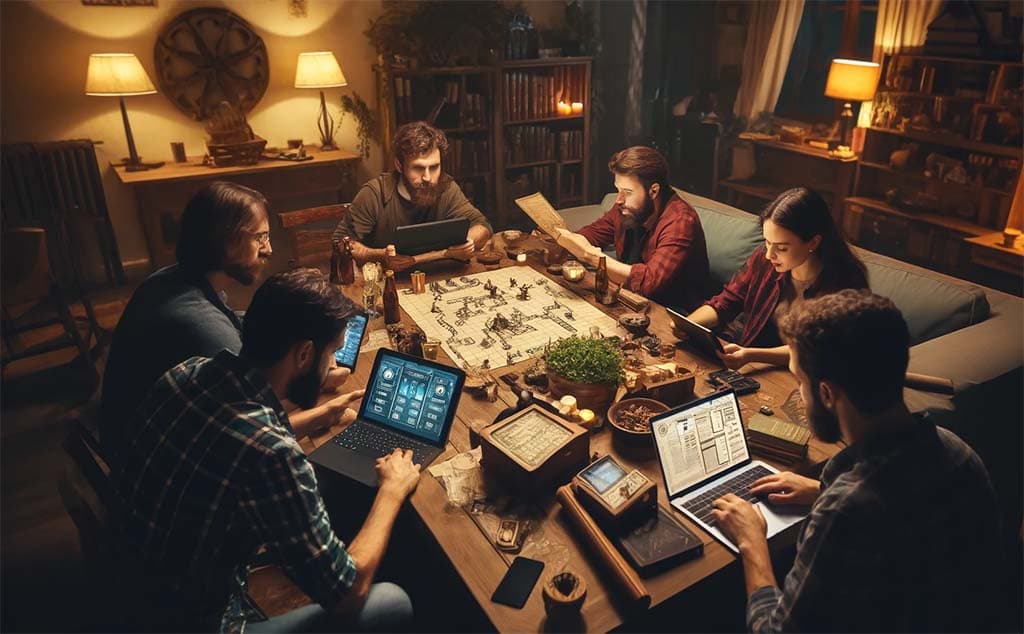
The Renaissance of Tabletop Role-Playing Games in the Digital Age

Tabletop role-playing games (RPGs) are experiencing a significant revival, thanks in large part to the advent of digital technology. This resurgence isn’t just about nostalgia; it’s about the evolution of a genre that is discovering new life in the digital age. With advancements in technology, tabletop RPGs are becoming more accessible, interactive, and engaging than ever before, attracting a new generation of players alongside seasoned veterans. The blend of traditional gameplay with digital enhancements has created a hybrid form of entertainment that respects the roots of tabletop gaming while embracing the future.
The Digital Catalyst: Technology’s Role in Reviving Tabletop RPGs
The infusion of digital tools into tabletop RPGs has been a game-changer, literally. Online platforms, virtual tabletops, and digital dice rollers have made it easier for players to come together, regardless of physical distance. These technologies have also streamlined the gaming experience, from character creation to campaign management, allowing for more time spent on storytelling and adventure. As a result, the barriers to entry for new players have been significantly lowered, making tabletop RPGs more inclusive and diverse.
Bridging the Gap: Online Platforms and Virtual Tabletops
Online platforms and virtual tabletops (VTTs) have been instrumental in bridging the physical divide between players. VTTs offer a digital space where maps can be shared, dice can be rolled, and characters can interact in real-time, all while providing the tactile feel of a traditional RPG session. These platforms have also enabled a resurgence of interest in older, niche, or indie RPGs, providing them a digital stage that they might not have had otherwise.
The Art of Storytelling: Enhanced by Digital Tools
Digital tools have not only made gaming more accessible but have also enriched the art of storytelling within RPGs. Storytellers and Dungeon Masters can now utilize software to create immersive worlds, complete with soundscapes, visual aids, and interactive story elements. This digital toolkit has opened up new avenues for creativity, allowing narratives to be more dynamic and engaging than ever before.

Community and Connectivity: Global Play at Your Fingertips
The digital age has transformed the tabletop RPG community, making it possible for players from all over the world to connect and play together. This global connectivity has fostered a rich exchange of ideas, cultures, and stories, enriching the RPG experience. Online forums, social media groups, and streaming platforms have also played a pivotal role in building vibrant communities around RPG titles, both new and old.
The Evolution of Game Design: A Digital Perspective
Digital technology has profoundly influenced not only the way tabletop RPGs are played but also the very essence of their design. Developers now have access to an array of digital tools that allow for the integration of virtual elements from the initial stages of game creation. This shift has given rise to a new genre of games designed to be played in both physical and digital formats, providing a flexible gaming experience that caters to a broad spectrum of preferences. Innovative game mechanics, such as digital character sheets that update in real-time or apps that manage complex game statistics, are becoming commonplace, enriching the gameplay and making the games more accessible to a diverse audience.
Challenges and Solutions in the Digital Tabletop Sphere
The transition of tabletop RPGs into the digital realm is not without its challenges. The digital divide, or the gap between those who have access to digital technologies and those who do not, can exclude potential players from experiencing these new forms of play. Additionally, screen fatigue — the exhaustion that comes from prolonged screen use — is a growing concern, especially when digital sessions can last several hours. Perhaps most significantly, maintaining the inherently social aspect of RPGs poses a challenge in virtual settings, where players are physically separated. However, the tabletop RPG community is known for its creativity and resilience. Game developers and players alike are constantly innovating, finding ways to minimize these drawbacks.
Future Horizons: The Ongoing Fusion of Tech and Tabletop RPGs
Looking ahead, the potential for further fusion between technology and tabletop RPGs is vast and exciting. Augmented reality (AR) and virtual reality (VR) technologies, in particular, stand out as the next frontier in immersive gaming. Imagine donning a VR headset to explore a dungeon in first-person or using AR to visualize a dragon landing on your living room table — these experiences could redefine the limits of imagination in gaming.
Moreover, the development of AI-driven narrative assistants could provide Dungeon Masters with dynamic storytelling tools, creating evolving stories that respond to players’ actions in real-time. As these technologies mature and become more accessible, the boundary between the physical and the digital will blur even further, opening up unprecedented possibilities for storytelling, adventure, and community in the world of tabletop RPGs. The future of tabletop gaming, enriched by digital innovations, promises to be more inclusive, creative, and immersive than ever before.